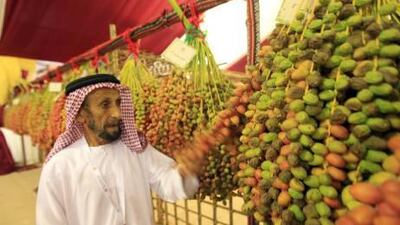LIWA // The secret to good dates, confides Abdulla Abdulla Jedam Al Mazrouei, is in the stars.
"Everything is by knowledge only," says Mr Abdulla, a Liwa elder who at nearly 90 is believed to be the community's eldest farmer. He is among the last of the farmers who use astronomy to cultivate date palms.
The palm is hardy yet fickle. It can overproduce one year and be barren the next. Its male and female trees must follow an exact regime for fertilisation, dictated by the stars.
For the date farmers of the Liwa oasis, one star shines brightest - Suhail. The appearance of the sky's second-brightest star signals the end of summer and "the best and most suitable" time to transplant the offshoots of the date palm from the roots system of its "mother" tree.
Suhail, or Canopus, is sighted in Liwa about August 16 or 17, and remains visible until late winter.
"When it appears, everything changes for the better," says Mr Abdulla. "The temperature will come down little by little and you can start to cultivate any crops ... vegetables, date palms or anything you like."
The star's rise marks the start of the farmer's droror calendar.
Agricultural cycles are measured from the appearance of Suhail in 10 or 13-day micro-seasons known as dir. In the so-called "seventies" - the period of 70 to 80 days after Suhail appears - camel grazing, studding and palm pollination can begin.
At this time, farmers climb the male trees to collect pollen-heavy boughs, which they then splash on the female trees. This period can last for months, but the ideal time is from late February until mid-to-late March.
"You can expect it is the best season for us," says Mr Abdulla. "When Suhail is above, everything is suitable here in our area."
Farmers measure temperatures using Al Murzim, a star in the Canis Major constellation. Its appearance brings a period of intense heat when there is "no cultivation at all".
It disappears in mid-January, casting a 10-day spell of extreme cold known as Al Batain, when you "have to be close to the fire".
The disappearance of the Pleiades star cluster, Thuraya, marks the ripening of the date, when its colour deepens from green to yellow or red.
"When the Thuraya disappears, you can see it in the sky that it means it is very hot," says Mr Abdulla.
A June sighting of Antares, the heart of the scorpion, signals the date harvest. Then, the re-emergence of Thuraya means that Suhail will be sighted soon and the palm cycle will begin again.
"The science, it's very old, it came from mariners," says Mr Abdulla. "They talk about many stars - Al Mirzum, Thuraya, Suhail."
Meanings and sightings varied from desert to sea, as Mr Abdulla learnt when he worked on the pearling ships as a diver for five years.
Stars were also used for irrigation timings in the falaj irrigation channels of Al Ain and Ras Al Khaimah.
Mr Abdulla is one of the last to know this oral tradition of star tracking, which is "thousands and thousands" of years old.
"Most of them who use it have died," says Hasan Ahmad Al Hariri, chief executive of the Dubai Astronomy Group. He has documented the oral almanacs created by men such as Mr Abdulla since 2004, and believes that the droror calendar system used in the UAE is nearly identical to systems across the Middle East and Asia.
"Part of this system is not working," says Mr Hariri. "The calendar is not as accurate as it was in the old time due to global changes in the weather. It is huge and it is unbelievable."
A common joke among elders is: "Did your calendar work this year?"
"We are joking with each other but also trying to observe the difference and see how it can be compensated with these 10-day periods," says Mr Al Hariri. "We're trying to make [the system] survive, but it isn't surviving."

